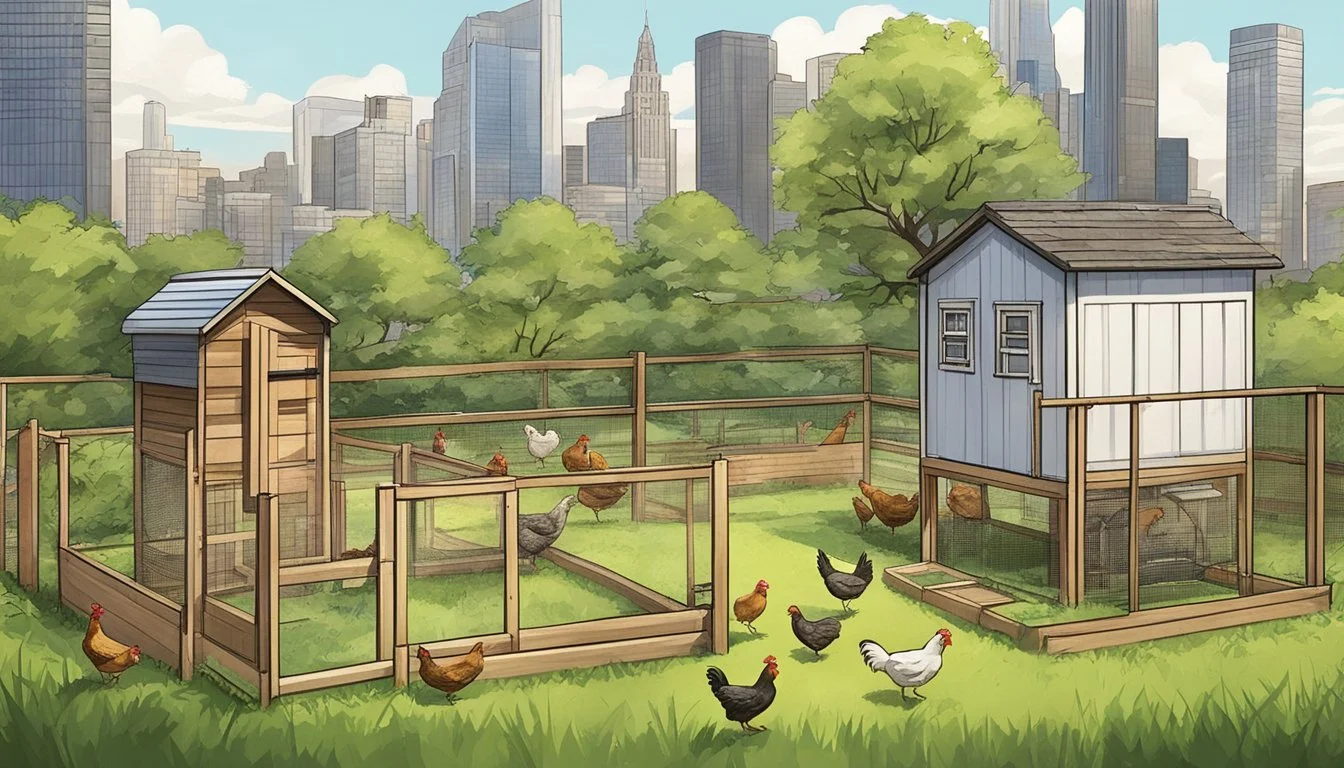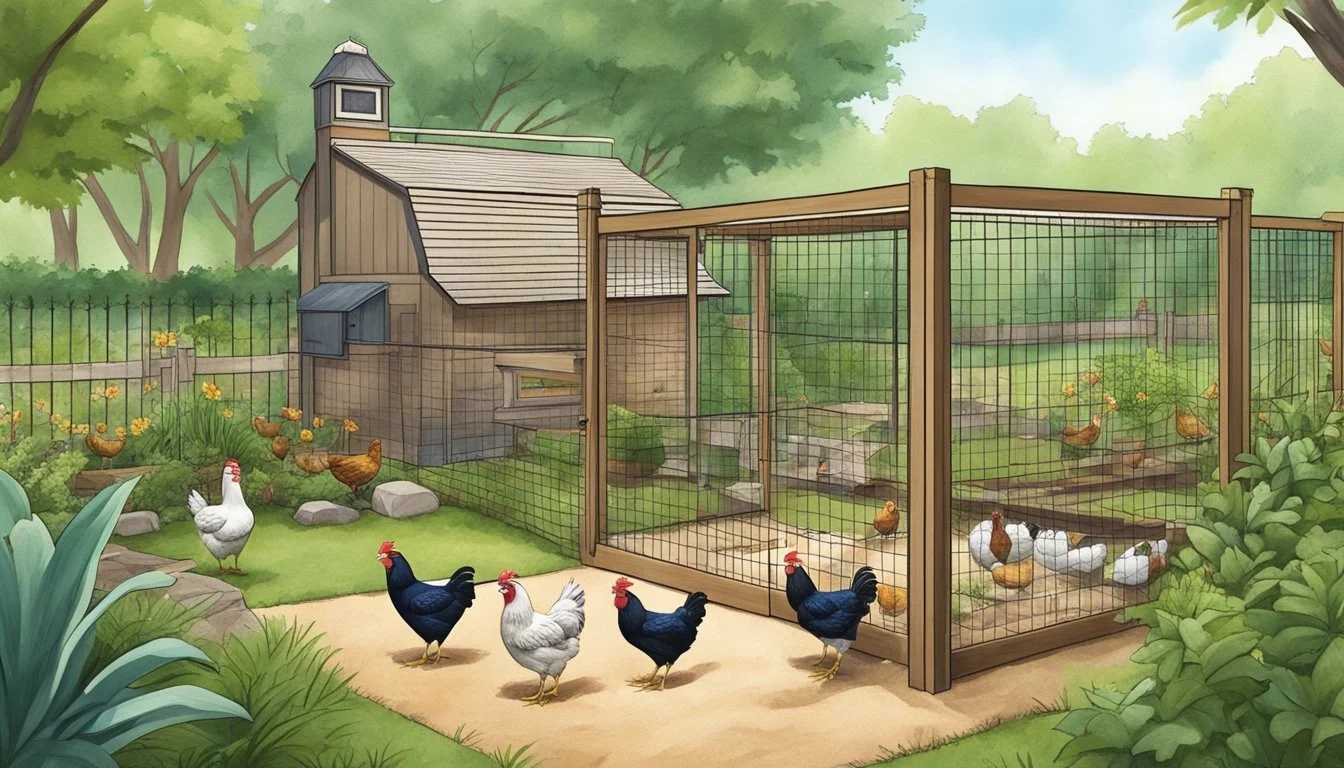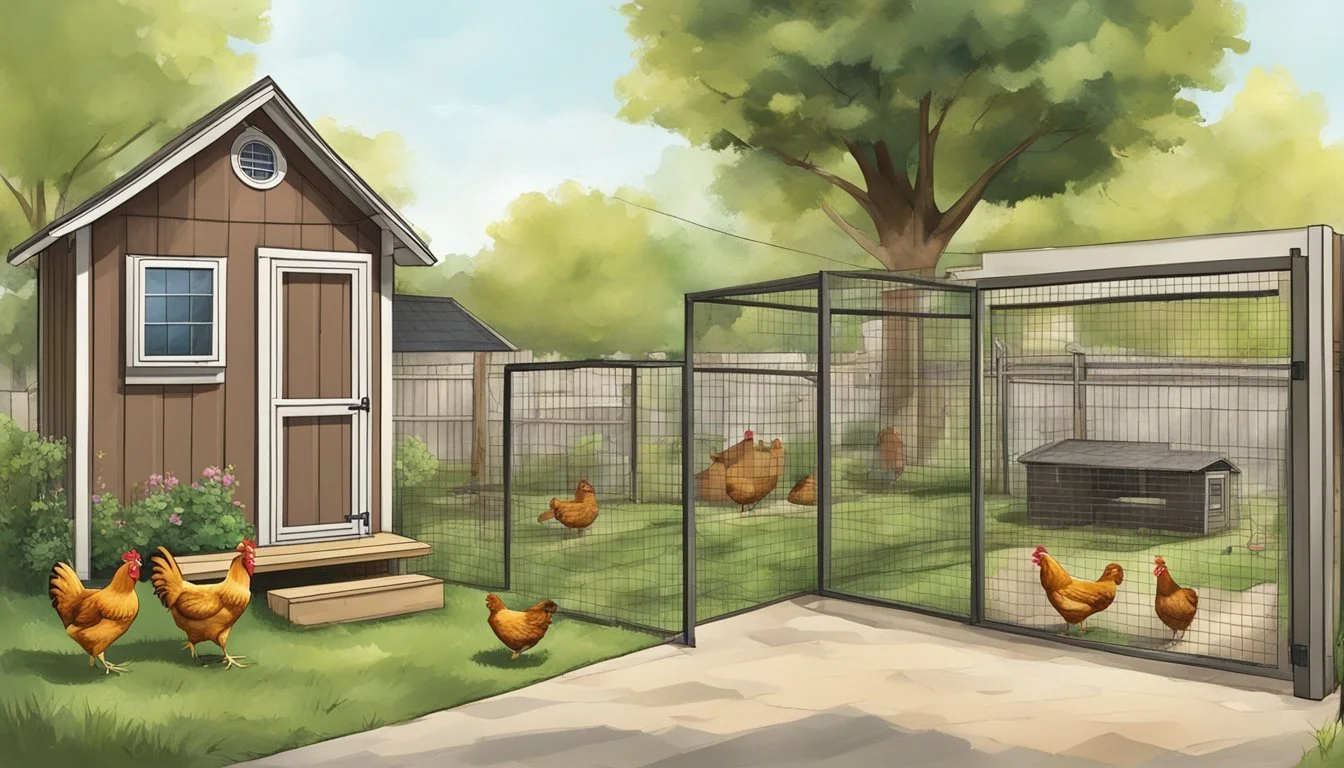Keeping Backyard Chickens in Austin, TX
Essential Tips for Urban Poultry Farmers
Backyard chickens are an increasingly popular choice for Austin residents looking to embrace a more sustainable lifestyle and gain closer control over their food sources. Austin's forward-thinking stance on urban agriculture allows for the keeping of chickens and other livestock in most residential areas. The city recognizes the multifaceted benefits that backyard chickens offer, including waste reduction, production of organic eggs, and natural pest control. This environmentally friendly initiative is in line with Austin's goal to significantly decrease the amount of waste sent to landfills by 2040.
To maintain harmony within the community and ensure the welfare of the chickens, the city has laid out specific regulations that residents must follow. Coops are required to be placed a minimum of 50 feet away from neighboring residences or businesses, mitigating any potential nuisances or health hazards. Austin's approach enables both the flourishing of backyard farming and the maintaining of sanitary standards in residential neighborhoods.
Prospective and current chicken keepers in Austin are encouraged to stay informed about the latest local ordinances. The integration of backyard chickens into Austin's urban fabric exemplifies the city's commitment to sustainability and aligns with its identity as a place that values local food sources and green living practices.
Understanding the Local Ordinances
When keeping backyard chickens in Austin, TX, it is critical to be aware of the local ordinances that regulate the practice. Staying informed and compliant helps ensure a smooth experience for both the poultry and the community.
City-Specific Regulations
The City of Austin permits the keeping of chickens and other livestock in most residential areas. These animals help to reduce food and yard waste, and in turn produce eggs, honey, and organic fertilizer. The Austin City Code clearly states the rules for maintaining these animals to balance urban agriculture with community standards.
Permit Requirements
As of the latest updates, Austin does not generally require a permit for keeping chickens, but local authorities should be consulted for any recent changes or specific permit requirements that may apply.
Restrictions on Roosters
While chickens are allowed, there are specific restrictions regarding roosters to prevent noise disturbance. Residents are generally advised to consult the Austin City Code or reach out to local authorities for the most current information on rooster regulations.
Penalties for Non-Compliance
Failure to adhere to city ordinances may result in penalties or fines. The enforcement of such penalties is to ensure that all livestock are kept in a way that respects neighbors and the community. The Austin Animal Regulation has the authority to enforce these rules, and residents should maintain their coops and flock in accordance with the established guidelines to avoid violations.
Choosing the Right Coop
Selecting an appropriate chicken coop is crucial for the wellbeing of backyard chickens in Austin. It ensures chickens have a safe, comfortable environment that complies with local regulations.
Coop Design and Location
The design of a chicken coop must cater to the climatic conditions of Austin. It should provide ample ventilation during hot summers while still offering shelter from rain and occasional cold. The location of the coop plays a significant role as well; it should be situated at least 50 feet away from any residence or business (excluding the owner's), as per Austin city ordinances. This reduces the chances of any nuisances to neighbors due to noise or odor.
Protection Against Predators
Chickens are vulnerable to various predators. A secure coop must have sturdy walls and a roof to prevent entry from raccoons, foxes, and birds of prey. All openings should be covered with predator-proof wire. The coop should include a lockable door, and an enclosed run should be attached to the coop to allow chickens to exercise safely.
Ensuring Adequate Space
Space is essential for the health and happiness of chickens. Each bird requires a minimum of 3 square feet inside the coop and 8-10 square feet in the outdoor run. Adequate space helps prevent the spread of disease and decreases stress among the flock. Overcrowding can lead to aggressive behavior and a decline in laying efficiency, therefore maintaining proper coop space is key to healthy chickens and a bountiful egg supply.
Proper Chicken Care
Keeping backyard chickens in Austin, TX, requires attention to nutrition, health, and routine care. Ensuring the well-being of chickens involves a sustained commitment to proper feeding, disease prevention, and regular maintenance.
Nutrition and Feeding
The foundation of chicken care is proper nutrition and feeding. Chickens need a balanced diet rich in proteins, carbohydrates, vitamins, and minerals. A typical diet includes:
Layers pellets: For egg-laying hens, providing essential nutrients.
Grit: To aid in digestion.
Fresh vegetables: To supplement their diet and reduce food waste.
Clean water: Always available for drinking.
Feeding should be regular to maintain the chickens' health and to support their growth and egg production.
Health and Disease Prevention
To prevent disease, chicken keepers must prioritize:
Sanitation: Regularly clean the coop to prevent the buildup of waste and bacteria.
Parasite control: Inspect chickens for signs of lice or mites.
Vaccinations: Administer necessary vaccinations against common poultry diseases.
The health of chickens is integral to successful chicken keeping, as it impacts not only the poultry but also public health.
Routine Maintenance and Inspection
Routine maintenance and inspection ensure the coop environment supports the chickens' well-being:
Ventilation: Ensure good air flow to reduce ammonia levels and moisture.
Security: Protect against predators with sturdy construction and locks.
Inspection: Regular checks for structural damage or potential hazards.
Proper care includes immediate action upon detecting any issues, maintaining the coop's sanitation, and providing a safe habitat for the chickens to thrive.
Raising Chickens and Sustainability
In Austin, Texas, backyard chicken keeping is not only a local trend but also part of a strategic approach to a sustainable future. This section outlines the role of chickens in composting, waste reduction, and providing a source of organic eggs.
Composting Chicken Waste
Backyard chickens contribute to a sustainable ecosystem by producing waste rich in nitrogen, an essential component for composting. Austin's Resource Recovery program recognizes the value of this process. Composting chicken waste transforms it into nutrient-rich fertilizer, reducing the need for synthetic alternatives. As part of a broader strategy, it complements the city's goal to achieve zero waste by 2040.
Reducing Food and Landfill Waste
Chickens play a pivotal role in waste management. By feeding chickens food scraps, households can divert significant amounts of waste from landfills. In Austin, a goal to reduce landfill waste by 90% by 2040 is underway, and backyard chickens are integral to this vision. They effectively lower a household's carbon footprint by minimizing waste production and the resulting methane emissions from landfills.
Sourcing Organic Eggs
The keeping of backyard chickens in Austin facilitates access to fresh, organic eggs. The eggs produced are a sustainable source of protein for many families. These eggs come from a controlled environment that often excludes the use of antibiotics and hormones, making them a healthier choice for consumers. With each hen consuming a quarter pound of food daily, the cycle of feeding and egg production exemplifies a self-sustaining loop within the local food system.
Community and Legal Considerations
Keeping chickens in a backyard setting within Austin, Texas requires a clear understanding of the community dynamics as well as strict adherence to legal ordinances. This ensures a harmonious relationship between chicken keepers and their neighbors and compliance with state and local laws.
Engaging With Neighbors and Schools
When introducing chickens to a residential area in Austin, it's crucial to engage with neighbors and local schools. One should inform neighboring residences of their intent to keep chickens and address any concerns they might have regarding noise or potential odors. Chicken coops must be positioned at least 50 feet from adjacent homes or businesses, especially if there's a risk of creating a health hazard. Additionally, involving schools in chicken-keeping activities can promote community involvement and serve as an educational tool for students to learn about sustainable living.
Understanding Broader Texas Chicken Ordinances
Beyond Austin-specific regulations, aspiring chicken owners must also understand the broader Texas chicken ordinances that impact urban poultry farming. While Austin allows the keeping of chickens in most residential areas, other Texas cities like Fort Worth and San Antonio may have different restrictions. For example, some may mandate a certain distance from residences or businesses, while others may have limits on the number of chickens one can keep without a permit. It is recommended to review the latest guidelines provided by local authorities to ensure compliance and avoid penalties.
In summary, successful chicken-keeping in Austin incorporates proactive community engagement and a thorough knowledge of applicable legal ordinances. This assures the interests of the wider community are respected, and that chicken enthusiasts can enjoy their hobby without legal interruption.
Business Aspects of Chicken Keeping
The rise of urban farming in Austin, TX, has paved the way for backyard chickens to become not only a sustainable lifestyle choice but also a profitable business venture. Entrepreneurs must understand the local ordinances and best practices to successfully navigate the business aspects of chicken keeping.
Venturing Into Backyard Chicken Businesses
In Austin, the interest in backyard chicken keeping has surged, allowing for a variety of business opportunities. Individuals can capitalize on the trend by offering services such as coop construction, selling chicken feed, or by breeding specialty chicken breeds known for high-quality eggs. Such businesses must comply with Austin’s urban farming ordinances to ensure that all operations are legal and sustainable.
Coop construction services have the potential to grow, as proper housing is essential for chicken welfare.
Selling chicken feed can be lucrative, considering that the average chicken consumes a quarter pound of food daily.
Breeding and selling chickens for their eggs can also be a source of income, with the average chicken laying approximately six eggs per week.
Best Practices for Slaughtering and Selling
For businesses that encompass slaughtering and selling chickens, adhering to humane and safe practices is paramount. They must follow Austin's health and safety regulations to maintain a reputable standing and ensure the well-being of both chickens and customers.
Humane slaughtering methods should be employed, aligning with industry standards and animal welfare laws.
Labeling and selling products must meet local health codes, including proper packaging and refrigeration.
Businesses should obtain the necessary permits before slaughtering or selling meat products to prevent legal issues.
The successful operation of a backyard chicken business in Austin requires attention to detail, knowledge of local regulations, and a commitment to sustainable practices. Entrepreneurs in the urban farming sector can find a niche market in Austin's dynamic and environmentally conscious landscape.
Challenges and Considerations
When keeping backyard chickens in Austin, TX, residents must consider how to manage odors and maintain sanitation, as well as understand the different needs during various chicken development stages.
Dealing With Odors and Sanitation
Odors can become a significant challenge when raising backyard chickens. To mitigate this issue:
Regular Cleaning: Coop cleaning should be performed weekly to remove droppings and refresh bedding.
Composting: Proper composting of chicken waste contributes to odor control and can be beneficial for gardens.
Sanitation is crucial in preventing the spread of diseases and controlling pests. Homeowners should:
Pest Control: Implement measures to deter pests such as mites and rodents by securing feed in rodent-proof containers and using poultry-safe pest deterrents.
Clean Water: Chickens require constant access to clean water; water sources must be checked and refreshed daily.
Managing Chicken Development Stages
Chickens go through various development stages, from pullets (young hens) to full-grown chickens. Each stage requires specific considerations:
Space Needs: As chickens grow, their space requirements change. Pullets can be raised in smaller brooders, but will need more room as they develop.
Predator Protection: Young chickens are more vulnerable to predators. Secure housing is essential to protect them at all stages.
By understanding these challenges and considerations, Austin residents can ensure a successful and rewarding experience with their backyard chickens.







